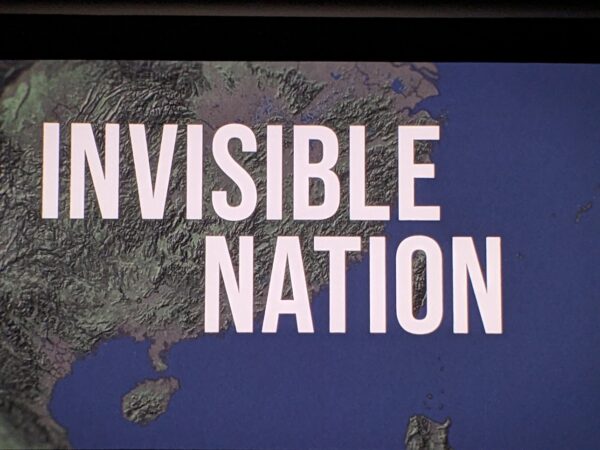I’m not sure how I became aware of the independent documentary Invisible Nation, screening at the Mill Valley Film Festival, but I am glad I did. I was able to make the second, Saturday morning screening a few weekends ago in Mill Valley, which was about 60 miles north of where I live in Silicon Valley. Invisible Nation is director Vanessa Hope’s intimate view of the presidency of Taiwan’s sitting head of state, Tsai Ing-wen, as she fights for the future of her nation.
From the documentary’s official website, Invisible Nation:
“With unprecedented access to Taiwan’s sitting head of state, director Vanessa Hope investigates the election and tenure of Tsai Ing-wen, the first female president of Taiwan. Thorough, incisive and bristling with tension, Invisible Nation is a living account of Tsai’s tightrope walk as she balances the hopes and dreams of her nation between the colossal geopolitical forces of the U.S. and China. Hope’s restrained observational style captures Tsai at work in her country’s vibrant democracy at home, while seeking full international recognition of Taiwan’s right to exist. At a time when Russia’s invasion of Ukraine has demonstrated the ever-present threat of authoritarian aggression, Invisible Nation brings punctual focus to the struggle of Taiwan as it fights for autonomy and freedom from fear.”
I was excited to meet with the film’s director/writer/producer Vanessa Hope and understand her motivations, as a non-Taiwanese/Chinese-American, to make the documentary. Sadly, she and her husband, Ted Hope (of Double Hope Films) were unable to attend since they were both sick with COVID.
Since the screening, I’ve been in touch with Vanessa & Ted. They were thrilled and happy how their team stepped up to have the spotlight shine on them. Michelle Kuo, who was an advisor and interviewed in the film as well, flew in all the way from Taipei the day before to help represent the documentary at the film festival and gave her opening remarks on behalf of Vanessa (see video below for the screening I attended Saturday morning). For the first, Friday evening screening, you can find Michelle’s remarks here on Instagram, and the post-screening Q&A here)
I was excited to see that one of my friends, writer/author/advisor to the film Shawna Yang Ryan (who is also interviewed in the film) and HoChie Tsai (“APIA Community Organizer by Day / Doctor by Night”), Founder & Director of TaiwaneseAmerican.org (who I like to call the “Godfather of Taiwanese America, 2nd Generation”), were in attendance.
As a Taiwanese American and a Cornell University alumni (“Cornellian”), I really loved the documentary, especially the lengthy exclusive interview excerpts with President Tsai Ing-wen (Cornell LL.M. ’80) – I think the first time I’ve seen Tsai speak at length in English at times in the film (I’ve also seen Tsai in person in Silicon Valley speaking Taiwanese/Mandarin). Impressively, the documentary also interviews former Taiwan President Ma Ying-jeou as well as former Speaker of the House Nancy Pelosi, among other interviewees.
Invisible Nations covers the history of Taiwan, from the early beginnings to the breakout of the Chinese civil war prior to World War II, the Republic of China and Chiang Kai-shek losing the civil war and fleeing to Taiwan, the martial law era (also known the “White Terror” era), the democratic liberalization of Taiwan, the first direct presidential election of Lee Tung-hui (also a Cornell alum, Ph.D.’68), the rise of the opposition party – the Democratic Progressive Party (DPP), the Sunflower Movement, and Tsai Ing-wen’s election and re-election.
The documentary also provides a historic overview of relationship between Taiwan and China and the modern day challenges of Taiwan in the current geopolitical environment as China actively tries to diplomatically erase and make Taiwan invisible in the international community and increasingly ramps up its political rhertoric and military exercises across the Taiwan Straits. The film also provides some context of Taiwan relative to what is going on with the Russian invasion of Ukraine – and describes the challenges of recent times that democracies face in the rise of autocratic tendencies in many nation states.
I’d say the only area that I think the documentary could have emphasized more is the economic and strategic importance of Taiwan’s semiconductor industry, specifically the U.S. CHIPS act past in the Fall of 2022 as well as the importance of semiconductor giant Taiwan Semiconductor Manufacturing Company (TSMC) to the world (manufacturing 90% of the world’ highest end microprocessors). Last October, 60 Minutes did a good overview of the situation in Taiwan including TSMC’s giant role in the silicon supply chain and Taiwan’s “Silicon Shield”. Or as a New York Times Op-Ed had described Taiwan,“Pound for Pound, Taiwan Is the Most Important Place in the World.”
I think it’s important to highlight the semiconductor industry because, relative to Ukraine, Taiwan is so much more important economically to the U.S. and the world, than is Ukraine. And Americans, and the world, those who do not follow Taiwan like you and I, need to understand that – if only because an invasion would directly affect everyone globally adversely beyond of course the very real concerns of a democratic country being invaded and the loss of innocent lives. People and countries are self interested, and the world economy would truly be screwed if China invaded Taiwan.
I think every American should watch Invisible Nation if they care to understand why it is important for the United States AND to the world, for global economic stability and for democracy globally. Taiwan is that “the shining city upon a hill,” the freeest nation in Asia and one of the freest in the world and a fantastic case study on how nations can evolve from an authoritarian regime to a significant and undeniably beacon of hope and symbol of what is possible for a nation to achieve.
My wish for this film is for the widest distribution possible within the United States and the world. The world must understand why Taiwan should be visible and why it must be diplomatically recognized – Taiwan is a defacto independent nation in every other sense. For now, Invisible Nation is making the well known film festival route and there is no scheduled wide release in theaters or via streaming yet.
Future Screenings
There is no current release date for Invisible Nation yet, but the film is making the film festival circuit, including these screenings:
Middleburg Film Festival (Middleburg, Virgina – one hour from D.C.)
Saturday, October 21st at noon
https://embed.showclix.com/event/invisible-nation
IDFA Festival – November 8-19
Amsterdam, Netehrlands. The 36th edition of IDFA, the world’s largest documentary film festival, runs November 8–19.
- Invisible Nation screening times
14 Nov 2023 20:45 Tuschinski 5
15 Nov 2023 15:45 Kriterion 1
16 Nov 2023 17:00 Munt 11
18 Nov 2023 16:15 Tuschinski 3
I’m hoping in the near future that all Americans, hell, everyone in the world, can watch Invisble Nation and learn more about Taiwan’s efforts to be visible and diplomatically recognized in the world.
From the Mill Valley Film Festival screening:
Video: 8:51 minutes. Pre-screening Remarks
Michelle Kuo, an advisor on the film, a Taiwanese American currently living in Taipei, flew in from Taiwan for the screening, and represented Vanessa Hope in her absence.
Video: 22:36 minutes. Post-screening Remarks and Q & A
From left to right: Wei-San Hsu (composer), Michelle Kuo (advisor), Shawna Yang Ryan (advisor), William Chen ( associate producer)










